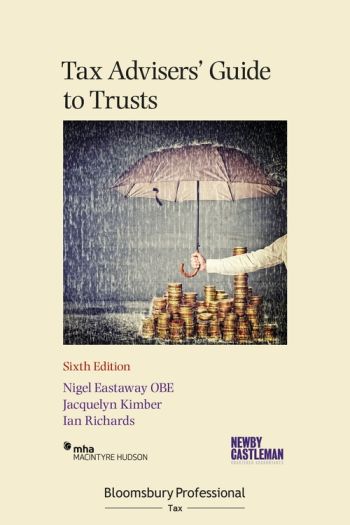Tax Advisers' Guide to Trusts 6th ed
ISBN13: 9781526511799
Published: February 2020
Publisher: Bloomsbury Professional
Country of Publication: UK
Format: Paperback
Price: Out of print
Demystifies the subject of tax and explains the tax rules and the way in which trusts can be used in practice as a flexible and effective means of wealth accumulation and protection.
This book concentrates on the UK tax rules applicable to trusts, resident in the UK, or abroad, and the resultant tax liabilities of the trustees, settlors and beneficiaries, and opportunities for reducing those liabilities where possible.
Since the last edition was published in early 2016 (reflecting F (No. 2) A 2015), there has been significant legislative change reflected in several Finance Acts, in relation to the following areas:
1. Administration/Enforcement/Reporting
- Introduction of the new penalty regime for offshore assets, with a higher level of penalties depending upon various factors, including territory
- New enforcement powers for HMRC
- Revisions to the Disclosure of Tax Avoidance Scheme (DOTAS) rules, especially regarding employee trusts
- The extension of time limit for assessment in relation to offshore matters, which has implications for offshore tax advisers, settlors and beneficiaries
- Introduction of the serial tax avoiders' regime (STAR), which enables HMRC to levy penalties, 'name and shame' taxpayers and require information to be submitted on defeated avoidance arrangements
- New corporate criminal offence of failing to prevent tax evasion
- New penalty regime for enablers of defeated tax avoidance schemes
- Trust Registration Services have been introduced by HMRC for registering new/existing trusts under anti-money laundering regulations
- Common Reporting Standard and reporting obligations
- Devolution of taxes to Scottish/Welsh national assemblies.
2. Capital gains tax
- 'Real time' CGT reporting is optional at present, but from 6 April 2020 it will become obligatory to report disposals of UK residential property to HMRC within 30 days of disposal, and pay any tax due
- Under the non-resident CGT (NRCGT) rules, a person resident abroad who makes a disposal of UK residential property must make a return to HMRC within 30 days and pay any CGT due. Different timelines apply if the person is within the NRL scheme; evidence suggests that these rules are still not well understood amongst the tax profession.
- Changes to the Entrepreneur's Relief rules in Finance Act 2019, in particular concerning the qualifying ownership period and the definition of 'personal company'
- From 6 April 2017, individuals who have been resident in the UK for 15 out of the previous 20 years will be deemed to be UK domiciled for income tax, capital gains tax and IHT purposes.
- Introduction of employee ownership trusts / various reliefs.
3. Income tax
- The abolition of requirement for banks etc to deduct basic rate income tax from payments of interest from 6 April 2016, meaning that trustees in receipt of bank interest no longer have taxable credit to offset tax liability
- The abolition of dividend tax credit from 6 April 2016
- The restriction on deductible interest from residential property rentals
- From 6 April 2017, individuals who have been resident in the UK for 15 out of the previous 20 years will be deemed to be UK domiciled for income tax, capital gains tax and IHT purposes and implications for settlement protections
- The proposed move to corporation tax rules for non-resident landlords from April 2020
- Amendments to disguised remuneration rules and the Rangers FC case re EBTs and payments of earnings, particularly relevant to trustees of employee trusts.
4. Inheritance tax
- The introduction of the residence nil rate band (RNRB), which is designed to allow a married couple to pass on a family home worth up to £1m to (broadly) descendants without falling within scope of IHT, including complex provisions dealing with 'downsizing'
- Residential property situated in the UK is no longer capable of representing 'excluded property' from 6 April 2017
- Change to the definition of 'deemed domicile' for IHT.
- Barclays Wealth case/prospective amendment of the rule for additions, which affects excluded property trust status and especially the treatment of inter-trust transfers
- The introduction of various exemptions for specific items, eg decorations and awards, certain medical personnel, etc
5. Other
- Various indirect tax changes that may affect trustees, eg increased SDLT rates etc
- Numerous changes made to the rules relating to pension administration.
The new edition also covers some significant cases which have emerged since the last edition including:
- The Rangers Football Club Plc v Advocate General for Scotland [2017] UKSC 45, re EBTs and payments of earnings, particularly relevant to trustees of employee trusts.
- Barclays Wealth Trustees (Jersey) Ltd & Anor v HMRC [2017] EWCA Civ 1512, re excluded property trust status and the treatment of inter-trust transfers
